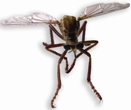READY TO GET STARTED?
REQUEST A FREE ESTIMATE
Fill out the form below or call (888) 466-7849 for a free, no-obligation estimate.
With our commitment to healthier living and working environments, we at Northwest understand the importance of good pest management for personal health. Living in a hygienic environment and minimizing exposure to unwanted pests can literally save lives. For instance, the lives of twenty-five million Europeans during the Late Middle Ages were claimed by fleas that had spread the bubonic plague. They managed this feat by using another pest as a host – rats! Modern improvements on hygiene, sanitation and pest management have dramatically reduced the impact of this disease.
Another more common disease brought on by insects is Lyme disease. This disease is carried by the deer tick in the form of a bacterium called Borrelia bugdorferi. If a deer tick bites you, the bacterium enters the bloodstream and will lead to skin rash and in extreme cases, paralysis. When caught early, antibiotics can eliminate the bacteria before it causes furthermore harm.
Mosquitoes in particular can carry a host of diseases such as dengue fever, malaria, pogosta disease, and West Nile virus. They carry similar traits in that when infected, a person will experience a fever indicating that more serious effects are on the way such as meningitis or arthritis. All these diseases can lead to death if not caught or treated properly. For some of these diseases, the best form of prevention is pest management. Northwest Exterminating provides solutions to reduce the presence of mosquitoes in and around your home or work environment.
If you come in contact with a pest and feel you may have been exposed to any disease, be sure to immediately seek medical attention. Many of these diseases, as well as others such as malaria or rabies can be treated when caught early.
Melissa Brown
[email protected]
Sources:
http://www.si.edu/Encyclopedia_SI/nmnh/buginfo/diseases.htm
http://en.wikipedia.org/wiki/List_of_diseases_caused_by_insects
 West Nile Virus has made its way back into the news for 2012. After a few years of laying low, health officials have warned that the virus is once again on the rise. Reports state that four times the usual number of cases for this time of year have been identified. As of August 27, the AJC reported that Georgia had seen 21 cases of West Nile so far, which is only 1 case away from the 22 total that were reported in 2011.
West Nile Virus has made its way back into the news for 2012. After a few years of laying low, health officials have warned that the virus is once again on the rise. Reports state that four times the usual number of cases for this time of year have been identified. As of August 27, the AJC reported that Georgia had seen 21 cases of West Nile so far, which is only 1 case away from the 22 total that were reported in 2011.
Labor Day weekend is often spent outdoors enjoying the last little bit of summer. If you and your loved ones are going to be outdoors for the holiday, we urge you to take steps to keep the mosquitoes away.
Steps for keeping away mosquitoes/West Nile:
If you are bitten and start to experience symptoms like dizziness or fever, contact your physician.
Happy Labor Day to all from Northwest Exterminating!

Watch out pests, it’s National Pest Control Awareness Month and the Georgia Department of Agriculture (GDA) Commissioner Gary W. Black is reminding Georgia residents to protect your homes and businesses from pests. Read the GDA’s recent press release for more tips and information on how to keep your home free from pests.
State Ag Commissioner reminds residents to protect homes, businesses
Spring has sprung in Georgia. This season is always a busy time for insects and pests in Georgia, but it is especially the case after such a mild winter. In honor of National Pest Control Awareness Month in April, Georgia Department of Agriculture (GDA) Commissioner Gary W. Black reminds residents about the risks posed by household pests.
“We are already seeing more insects and pests earlier this year due to the warm winter Georgia has had,” said Commissioner Black. “Every year, pests cause millions of dollars in damage for our residents and it is important for Georgians to prepare a plan of action to help prevent damage from occurring.”
In addition to fees paid for control and preventative services done by pest control professionals, Georgia residents spend untold dollars to repair damage caused by pests such as termites, rodents and carpenter ants who chew through walls, flooring and even electrical wiring. Residents also pay for expenses related to the treatment of medical conditions; mosquitoes can carry West Nile virus while house dust mites and cockroach allergens trigger asthma attacks, and stinging insects send more than half a million people to the emergency room every year.
“I encourage all Georgians to take proactive steps to prevent infestations in their homes and businesses,” said Commissioner Black. “All it takes is a few simple, preventative measures to help protect year-round.”
In April, consider these tips and suggestions:
– Trim back trees and shrubs so they are not physically touching any building structures;
– Walk the perimeter of a structure’s foundation and seal up any cracks or small openings;
– Install window and/or door screens and check once a year for holes or tears;
– Keep wood debris and piles of wood (including firewood) at a distance;
– Check plumbing and pipes to eliminate sources of moisture or standing water;
– Tightly secure all food and garbage to prevent pests from finding their way to the source (this includes pet food dishes and storage containers); and
– If there are any visible signs of pests or an infestation, contact a licensed pest professional immediately.
“April is a great time to have your home or business checked to determine if it’s necessary to re-establish any pest control measures, such as termite protection” said Commissioner Black. “And if control or treatment is necessary, that is one homeowner project best left to the professionals.”
Consumers are urged to only seek advice and use licensed professional pest control companies. If a company is not licensed by the GDA, it is illegal for them to practice pest control protection as a business. Residents can find a list of all licensed professional pest management companies at www.kellysolutions.com/GA/Structural/searchPCOCo.asp, or contact the GDA Structural Pest Section at 404-656-3641.
Note: Consumers can learn more about Pest Control Awareness Month, the GDA’s Structural Pest Section and hear from industry partners in a short video clip available on the Department’s website homepage starting April 1: www.agr.georgia.gov.
The Georgia Department of Agriculture is responsible for licensing the professional pest management companies who perform termite control. There are approximately 1,200 of these companies operating in Georgia. Learn more online at www.agr.georgia.gov.
Disclaimer: The following are general guidelines to follow and do not constitute medical advice
Ticks like to “hang out” in low lying shrubs, bushes or plants waiting for animals to come by to supply them with the blood meal that will help them complete their life cycle. Ticks then climb on the animal or human and attach themselves to obtain the blood from their victims. In the process they inject saliva and suck blood from the host, much like mosquitoes.
In general, most tick bites do not transmit disease. More commonly they are associated with infection around the site of the bite, local irritation, allergic reaction, or the cause of retained mouth parts when the tick is removed. The sooner you can remove the tick, the less likely they are to transmit diseases, so get them off quickly!
How to remove a tick
Most of the time, a pair of tweezers and slow, gentle, upward pressure will get rid of the tick. Burning the tick off may not work and may cause a burn to the patient. For a nice diagram and instructions please see the CDC website about how to remove a tick:
http://www.cdc.gov/ticks/removing_a_tick.html
If there are retained parts, please see your doctor so they can recommend options for getting the head out or letting it come out on its own.
Tick Borne Diseases
There are some serious diseases associated with tick bites. Usually they are associated with fever, feeling ill, and a rash. A few of the more common illnesses are: Rocky Mountain Spotted Fever, Lyme Disease, Erlichiosis, and Tularemia. Please contact your doctor immediately if you develop a rash, fever, or are feeling sick after a tick bite.
To avoid ticks, know where to expect them and use a bug repellant. Ticks live in areas that are grassy or near woods. They are often found in bushes and shrubs and can become a big problem when grass is too high. A bug repellant, such as DEET, can protect you for several hours.
If you find ticks on you, someone in your household, or a household pet, call Northwest Exterminating to speak to someone about a way to get rid of ticks.
Thanks,
Dr. Goo
Disclaimer: The following are general guidelines to follow and do not constitute medical advice.
Spring brings with it flowers, pollen, birds and bees! But it also brings pests that are returning from their winter break. For many of us, mosquitoes are a real problem that keeps us from enjoying the outdoors. But more importantly, mosquitoes can carry diseases such as West Nile Virus and Eastern Equine Encephalitis Virus. They can also cause heartworm in dogs. *Click here for a brief outline on these diseases* These diseases are very serious but fortunately, rarely directly related to mosquitoes.
In General
In general, the problem with mosquito bites is due to an allergic reaction to the mosquito’s saliva and the problems associated with swelling and scratching of the mosquito bite. When a mosquito bites you they inject saliva which helps keep the blood from clotting. The saliva causes an inflammatory reaction which causes the itching and swelling associated with the bite. Most people just get a big irritating lump on the skin which if they scratch becomes more swollen and lasts longer. But some people actually have an allergic reaction to the mosquito saliva and can become very ill.
For the itching and swelling, anti-histamines are recommended. Diphenhydramine (commonly known as Benadryl – TM) can be used orally or applied in creams or lotions combined with calamine. Anti-inflammatory steroid creams may help too – creams like 1% hydrocortisone.
Interesting Fact: Only female mosquitoes bite and suck blood to obtain protein for their eggs; male mosquitoes suck nectar.
Impetigo
Even if you don’t get sick from the mosquito, many people scratch their bites until they bleed. When the skin is open it is susceptible to secondary infection. Children and adults can get a skin infection called impetigo which is a superficial skin infection caused by bacteria called staph and strep. Impetigo causes open sores and crusting (honey colored) and swelling in the areas. Impetigo is usually worse in the summer when children are out playing in the dirt, getting bitten by mosquitoes, and then getting those sores infected. Excellent hygiene (SOAP and WATER) can prevent most impetigo and cure mild cases. Over the counter antibiotic ointments (like Bacitracin) can help too as well as prescription ointments like mupurocin. There may be enlarged glands in the area, fever, and a spreading rash. Usually more severe impetigo needs an oral antibiotic so contact your doctor if you think you have impetigo and need medicine for it.
Heartworm
Man’s best friend can be affected with heartworms which are also transmitted by mosquitoes. So protect your entire family against these pests.
Prevention
The best prevention is to eliminate mosquitoes from your environment. Since this is virtually impossible to do completely, several strategies should be employed:
Give your family the best protection against mosquitoes by calling Northwest Exterminating for their Green Mosquito Control Program. Be sure to ask for your FREE inspection!
Thanks,
Dr. Goo